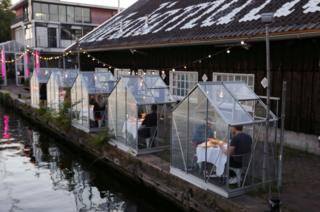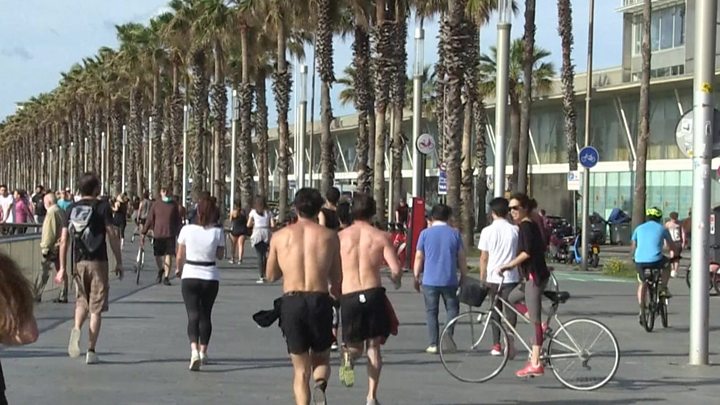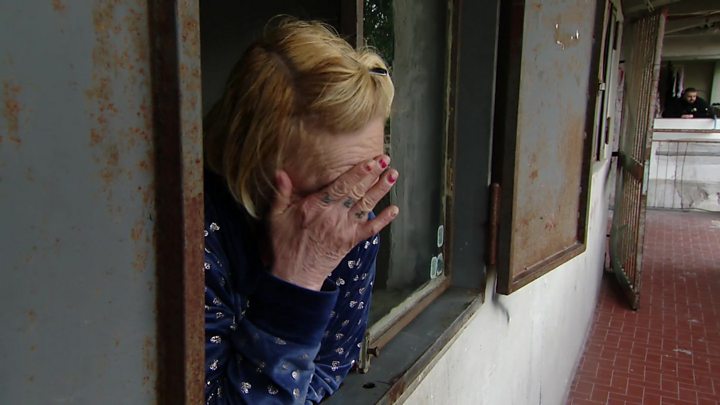 Image copyright
Reuters
Image copyright
Reuters
After almost seven weeks of lockdown in the UK, the measures are being eased.
Across Europe, people are already seeing an easing of lockdown measures, as businesses reopen and children start going back to school. Here is how Europeans are emerging from life under lockdown.
Germany: Shops reopen and football resumes
Germany has begun opening up: control of lifting the lockdown will now be in the hands of Germany's 16 federal states. But Chancellor Angela Merkel has stressed that an ''emergency brake'' will be applied anywhere that sees a surge in new infections.
- Shops of all sizes are now allowed to reopen, with extra hygiene and social distancing measures
- Shops smaller than 800 m2 have been allowed to open since 20 April, alongside car dealerships, bicycle shops and bookshops
- Schools have been partially reopened for young children and those taking exams. All other classes will return gradually throughout the summer term
- Border controls are being eased on 15 May with Austria, France and Switzerland and then lifted on 15 June
- Bundesliga football matches resume behind closed doors on Saturday 16 May - the first big European league to do so
- Two different households are now allowed to meet up with each other
- Big public events like festivals are banned until at least the end of August
Germany says football can resume and shops reopen
France: End to travel permits
France's strict lockdown was imposed on 17 March and residents were required to provide a travel permit justifying any trips outside. From 11 May, those restrictions have been eased and the situation will be reviewed after three weeks.
- Residents no longer have to provide travel certificates, and car journeys within a radius of up to 100km (62 miles) from home are now permitted. Longer trips still require a certificate and during the rush-hour in Paris you will need your employer's authorisation or a compelling reason to travel
- The lockdown map shows France split in two, with four "red zones" including Paris keeping parks, gardens and schools for 11 to 18-year-olds shut for the time being
- Primary schools and nurseries began reopening after 11 May, while schools for 11 to 15 year-olds (collèges) in "green zones" will open on 18 May. A limit of 15 pupils will be put on classrooms and masks will be compulsory for older children. Schools for 15 to 18-year-olds (lycées) are not opening before June
- All shops (bar Paris shopping centres) can now reopen; leisure centres and cemeteries can reopen but bars and restaurants will remain closed
- Gatherings of fewer than 10 people are also permitted; the elderly and vulnerable are allowed out but must use common sense
- Beaches have also begun reopening, the first on the Brittany coast and under tight restrictions
Ireland: Five steps and small summer weddings
Ireland has had a stricter lockdown than the UK, with residents only allowed to exercise within 2km (1.2 miles) of their homes. But a five-stage roadmap to re-open the country starts on 18 May, with restrictions eased every three weeks.
- Schools will remain shut until September, while outdoor workers such as construction workers and gardeners will be allowed to resume activities from May 18
- Creches and nurseries will open for the children of essential workers from 29 June, and this will be extended to the children of other workers from 20 July. Childcare workers will be sent to the homes of 5,000 essential workers from 18 May
- Social visits will be permitted to other households from 8 June, and from 29 June, people will be allowed to travel within a 20km radius of their homes
- Weddings, baptisms and small social gatherings will be allowed from 20 July, but only for family and close friends
- Shops selling non-essential items can open from 8 June if the number of staff and customers remain small, and larger premises can open from 29 June
Belgium: Four people in your social bubble
Restrictions are slowly being lifted in a country that has seen a high number of deaths in care homes. "We will have to resume our social life very gradually," said Prime Minister Sophie Wilmès as she detailed Belgium's exit road-map.
- Since 10 May, people living in the same household have allowed to receive visits from a group of up to four people. But these people are not allowed to visit anywhere else
- Fabric shops reopened on 4 May, as new regulations require all Belgians aged 12 or over to wear masks on public transport
- Other shops reopened on 11 May subject to strict adherence to social distancing guidelines
- Schools resume classes from 18 May, but no more than 10 children will be allowed in each classroom
- Markets, museums and zoos will also be allowed to open from 18 May. Markets will be restricted to 50 stalls and museums and zoos will have to set up one-way systems and sell time-specific tickets online to limit crowding
- Hairdressers and beauty salons are to reopen on 18 May as well, but only for those with appointments
- Cafes and restaurants will start to open from 8 June
Sport training will also be allowed to restart on 18 May, limited to 20 participants. No public sporting or cultural events can take place before 30 June.
Netherlands: Hairdressers and nail bars back in business
The Netherlands imposed a far less strict lockdown than its southern neighbour. Prime Minister Mark Rutte has unveiled a five-phase plan for easing lockdown restrictions that kicked in from 11 May.
- Libraries are opening to visitors and hairdressers, nail bars, beauticians, masseuses and occupational therapists are back at work from 11 May. Primary schools will also partially reopen
- Bars and restaurants will be able to open their outdoor spaces to customers from 1 June; secondary schools will also reopen
- Public transport services will resume pre-lockdown schedules, provided travellers wear face-masks
- Campsites and holiday parks can reopen from 1 July, as can theatres, restaurants and cinemas with up to 100 customers with social distancing
- People can play team sports outdoors as long they observe social distancing
- Larger events and contact sports may resume in September, along with sex clubs and saunas
Austria: Tourist attractions to reopen
Austria was one of the first countries to ease its lockdown. The health minister says the reopening of small shops in the middle of April hasn't caused a spike in cases, with new infections increasing by just 0.2%. But he said May would be the "decisive month".
- Larger shops, shopping centres and hairdressers reopened in early May
- Public parks, small shops, DIY stores and garden centres have been allowed to open since 14 April
- Outdoor sport that can be socially distanced, such as tennis, golf and athletics is now allowed
- Gatherings of up to 10 people have been allowed since the start of May
- Restaurants and cafes will open from the mid-May, while hotels, zoos, swimming pools and tourist attractions will open from the end of the month
- Pupils in their final year of school returned to classes at the beginning of May. Other years will start returning from the middle of the month
Denmark: Restrictions eased since mid-April
Denmark, one of the first European countries to announce a lockdown, started to roll back measures in mid-April and is moving ahead with the second phase of its road map.
- Day care centres and primary schools returned on 14 April, although parents and visitors are not allowed on school premises and children arrive and leave school at different times. Children aged 12-16 will return from 18 May, as will exam students
- Hairdressers, beauty and massage salons, optometrists, podiatrists and chiropractors reopened on 20 April
- Professional sport is allowed behind closed doors, along with amateur sport under guidelines
- Shopping centres reopened on 11 May with social distancing guidelines
- Social gatherings are limited to 10 people
- Cafes and restaurants reopen on 18 May, with social distancing, as do zoos and libraries
- Borders remain shut
- Phase 3 starts on 8 June and covers museums, cinemas, indoor sports and colleges
- Phase 4 in early August will include gyms, swimming pools and nightclubs
Spain: Schools to remain shut until September
Spain outlined a four-stage plan on 4 May to start rolling back one of the strictest lockdowns in Europe, which saw children under 14 confined to their homes for six weeks.
Restrictions will be eased in two-week blocks until 10 June, but only in some parts of the country. Madrid, Barcelona, Granada, Malaga and some regions in the north-east will stay under full lockdown for the moment.
- Schools will be partially reopened from 26 May. This will allow for revision classes and state exams but a full reopening is not expected until September
- From 11 May, customers can order a beer in a terrace bar but bars and restaurants will not fully reopen until 10 June, adhering to strict social distancing guidelines and only at 50% capacity
- Cinemas, theatres and exhibitions will be allowed to open from 26 May, but will only be allowed to operate at 30% capacity. Outdoor concerts of up to 400 people will be permitted if concert-goers remain at a safe distance from each other
- Churches and mosques can reopen from 11 May, but only at partial capacity

Italy: Funeral gatherings now permitted
Italy imposed a strict and lengthy lockdown, with a ban on walking or exercising more than 200m away from home. In early May, some restrictions were relaxed and people are now able to travel for longer distances, as well as visit their relatives in small numbers. Visits to other regions of the country are still banned.
- Bars and restaurants, which can offer takeaway services, are expected to fully reopen for dine-in service from 1 June
- Hairdressers and beauty salons are due to reopen from 1 June
- More shops will reopen on 18 May along with museums and libraries
- Sports teams will also be able to hold group training from 18 May
- Funerals are now allowed with a maximum of 15 people attending, ideally outdoors
- Schools will not reopen until September
- The Catholic Church will be allowed to hold masses from 18 May

Switzerland: Museums and restaurants return
Switzerland began easing its eight-week lockdown in stages from 27 April, with each new stage depending on the success of the last. At one point in March, cases of coronavirus were doubled and even tripled within 24 hours.
- Garden centres, hairdressers and beauty salons were allowed to reopen on 27 April
- Schools, libraries, museums and non-food shops followed on 11 May, with strict distancing measures
- So too did restaurants, bars and cafes with a limit of four guests per table, with tables two metres apart
- Hand sanitiser is being provided at railway stations and passengers are advised to wear masks on public transport and work at home if possible
- Zoos, swimming pools, mountain railways, cinemas and theatres may open on 8 June, when gatherings of more than five people may be permitted
- Open air events and gatherings of more than 1,000 are banned until at least the end of August
Greece: Tourism central to reopening plan
Greece recorded its first Covid-19 case on 26 February and the government acted swiftly to impose a lockdown. On 28 April, Prime Minister Kyriakos Mitsotakis announced a relaxation of lockdown measures in the weeks ahead.
- Churches opened for individual prayer on 4 May and religious services will be allowed from 17 May
- Schools are reopening on 11 May for final year students only, with special measures including students attending classes on different days
- Shops are now all able to reopen from 11 May and indoor shopping centres can do so on 1 June
- Restrictions on movement are relaxed on the mainland on 18 May
- Cafes and restaurants will be allowed to open on 1 June, but only with outdoor seating and clear distance between chairs
Greek scientists are working on rules on cleaning, social distancing and testing to open the country to tourists this summer. Beaches reopened on 4 May and Greece's organised beach clubs resume on 16 May.
Russia: Starting to go back to work
President Putin announced that Russia's nationwide lockdown was being eased from 12 May, and that businesses could go back to work to stop unemployment rising further. He also said it was up to individual regions to decide the best policy. Russia reported at least 10,000 new infections for 10 days in a row up to 12 May.
- Construction and industry are the sectors which should be the first to resume work, according to President Putin
- But large public events will still be banned, and those aged over 65 will be urged to stay at home
- Moscow, as the worst-hit city, is keeping tough restrictions in place until at least 31 May
- From 12 May it is compulsory to wear gloves and masks in shops and on public transport in Moscow.
- Only food shops and pharmacies are open, schools are shut and many people are working from home.
Poland: Parks and forests first to reopen
In Poland, Covid-19 numbers are lower than in many Western European countries. Most of the recent infections have been amongst the country's coal miners in the southern Silesia region. Poland began lifting restrictions on 20 April, when parks and forests were allowed to reopen.
- Hotels, shops, shopping centres, museums and galleries reopened on 4 May, with one customer per 15 sq m of space allowed
- Nurseries were given the option to reopen from 6 May
- Face coverings in public will remain obligatory until a vaccine is available
- Restaurants, cafes, hairdressers and beauty salons will reopen from 18 May
Sweden: Strict restrictions never imposed
Strictly speaking, there was no real lockdown so Sweden does not have much to remove. It never imposed measures like those seen across the rest of the continent.
- Restaurants, bars, schools and businesses remained opened. But it did ban gatherings of more than 50 people and visits to nursing homes for elderly
- Sweden has recorded over 3,000 deaths, the highest per capita number compared with the rest of the Nordic countries
- Most of the population have taken to voluntary social distancing. many are working from home, keeping at least a metre away from other people at least some of the time and refraining from travelling.